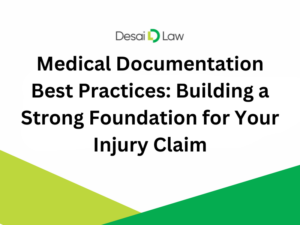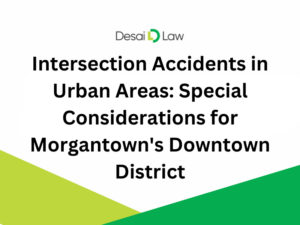The impacts of a car accident on the life of someone who was involved are not always physical or financial. Being injured in an accident, witnessing someone die, or even being afraid for your own life can result in psychological impacts as well, including a condition known as post-traumatic stress disorder (PTSD).
If you have suffered PTSD from a car accident caused by someone else’s negligence, you can seek compensation for the impact of the condition on your quality of life. An experienced car accident attorney can tell you how.
What Is PTSD?
As explained by the American Psychiatric Association, PTSD can happen to anyone, of any gender, ethnicity, social class, or age group, as a response to witnessing or being involved in a traumatic event.
While the condition is most commonly associated with combat veterans, about 3.5 percent of the U.S. adult population is affected by PTSD every year for many reasons-including car accidents; 11 percent of people will develop PTSD in their lifetimes, with women twice as likely to suffer from the condition as men.
What Are the PTSD Symptoms Most Commonly Suffered After a Car Accident?
Some of the symptoms of PTSD most commonly experienced by those involved in serious car accidents include:
- Psychologically re-experiencing the trauma through intrusive thoughts or dreams about the accident.
- Persistent avoidance of thoughts or situations related to the accident. For example, a common symptom of someone suffering PTSD after a car accident is fear of or refusal to drive a car.
- Numbed emotional response, such as failing to produce emotional responses to the needs of others or feeling detached.
- Increased physical arousal, such as startling easily, becoming quickly agitated, or having trouble sleeping.
The Impacts of PTSD on the Sufferer’s Life
PTSD after a car accident often results from traumatic events such as witnessing someone die or become seriously injured, having serious injuries involving a lengthy recovery period or particularly painful treatments, or the sufferer has witnessed repeated traumatic incidents.
Up to 80 percent of people with long-term PTSD develop additional mental health issues, including depression, anxiety, or alcohol or substance misuse. These issues and the symptoms they cause can make it difficult for the sufferer to work, focus on school, obtain adequate sleep, and maintain healthy relationships with others. The condition can result in frequent emotional outbursts or detachment that make relationships difficult and increase the risk of injury or death.
Seeking Compensation for PTSD After a Car Accident
Generally, individuals can seek compensation for PTSD as a non-economic damage, which involves compensation for the quality-of-life impacts of being injured in an accident.
Because this compensates psychological impacts instead of financial ones, the compensation you can seek for the injury depends on:
- The severity of the physical injuries you suffered.
- The type and duration of treatment you incurred.
- Whether you have been diagnosed with PTSD.
- The impact of the condition on your ability to earn an income.
How Much Compensation Can I Receive for PTSD?
Due to the unique nature of the condition and the combination of its impacts with the other injuries and impacts experienced as a result of the accident, it is impossible to come up with an “average” award for clients seeking compensation for PTSD.
Some of the factors that can affect the compensation available for non-economic damages include:
- The amount of insurance the at-fault party has.
- The impact of your condition on your ability to earn an income.
- The circumstances of the accident, such as the severity and whether there were fatalities.
How Can You Prove PTSD?
The easiest way to prove PTSD resulting from a car accident is to be formally diagnosed with the condition by a medical doctor or mental health provider. PTSD treatment can include both therapies focused on confronting the traumatic memory and working through the beliefs associated with the experience and prescription medication in some circumstances that can reduce the mental health conditions associated with PTSD, such as anxiety and depression.
To diagnose PTSD, a medical doctor may perform a physical exam to ensure that no physical injuries are causing the condition. A psychological examination may determine if your symptoms align with the diagnostic criteria for the condition as listed in the Diagnostic and Statistical Manual of Mental Disorders, published by the American Psychiatric Association.
Suppose you have not obtained a formal diagnosis of PTSD. In that case, you can often still seek compensation for the psychological impacts of your injury through witness testimony from your employer, family, or friends as to how the emotional trauma has affected your ability to work, socialize, or maintain the responsibilities of your day-to-day life.
A Car Accident Lawyer Can Help You With Your Claim
An experienced car accident attorney can provide several services to help a client seeking compensation for the psychological impacts of their injury.
Some of those services include:
- Properly valuing the claim to provide compensation for the treatment of the claimant’s psychological injuries.
- Providing documentation of the condition to the insurer and/or the court to show the need for compensation for PTSD.
- Fighting against insurance company tactics to reduce the value of a claim, such as an insurer claiming that there is no compensation available for non-economic damages.
- Managing the deadlines in your case to ensure your right to seek compensation not only from the insurer, but to file a claim in court if the insurer fails to fairly compensate you for your injury.
Let the right legal team tell you more about the personal injury claims process. Contact a car accident attorney for a free case evaluation today to discuss your claim and legal options.





